The #1 Mistake Smart People Make
The number one mistake smart people make is they need to do a great job—and because of this, they only focus on productivity. Ultimately, smart people focus too much on completing tasks rather than other people and building relationships.
Task-focused thinking has become a considerable problem for smart people, as they often prioritize metrics over rapport and, as a consequence, treat people as distractions.
So if you’re not getting along with your coworkers, here’s a simple equation that might help:
The Work + People Equation
Doing great work is essential, but it’s only one part of the equation. The second part is about building great relationships. According to a study by Officevibe, 70 percent of employees stated that having friends at work is the most crucial element to happy working life. If you don’t have great relationships, people won’t recognize you for the great job you do. And most importantly, people might not like you.
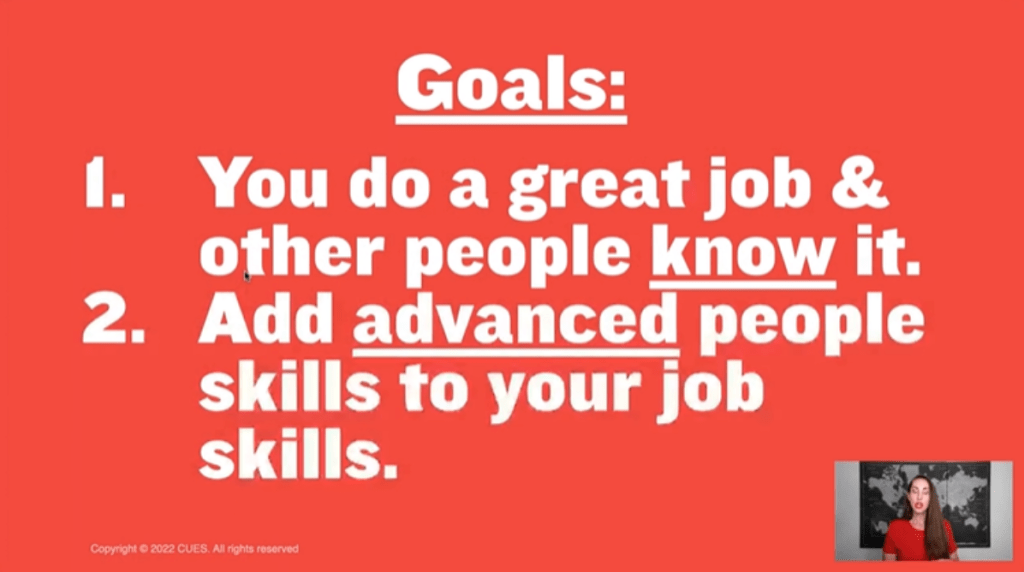
Smart people tend to focus more on their smarts and technical skills. But if you marry people skills with your job skills, this is the most potent combination for workplace success.
Great work + Great people skills = A great impression
Adding your people skills, soft skills, and excellent communication will make your work easier and help you achieve your goals faster.
People who are more likable at work are more likely than their equally-qualified counterparts to
- Be promoted
- Earn higher salaries
- Feel happier at work and home
Action Step: Grab a pen and paper and make a list of three people in your life who you want to make a fantastic impression with. Write them in three different columns.
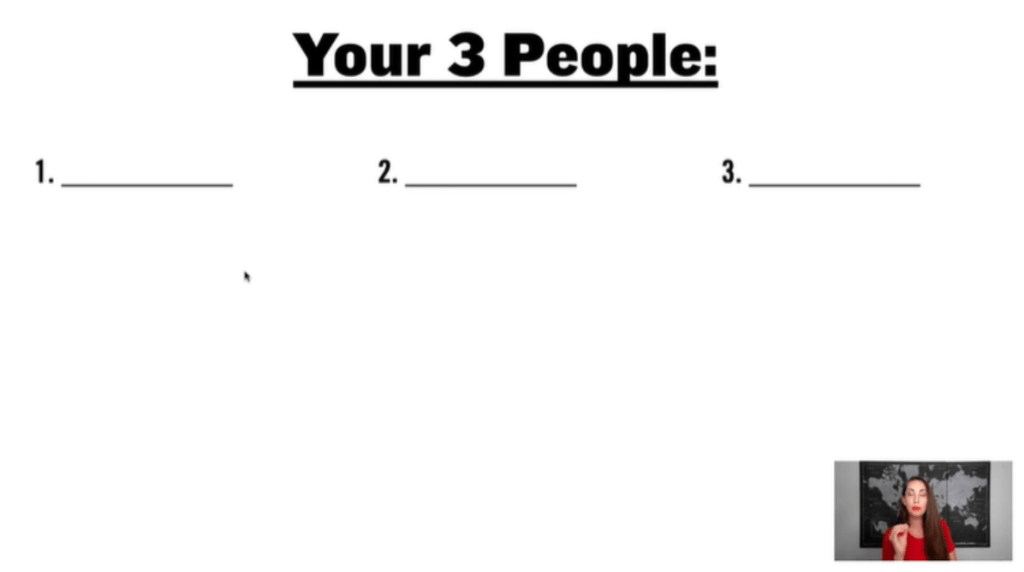
These can be people, including your boss, coworker, family member, spouse, friend, mentor, or anyone else you can think of.
In your 3 people table, answer this question for each column: “If they had to describe me in one word, they would say _______.” Write your answer under the respective columns that you made. If you don’t know the answer, you can put “?” instead.
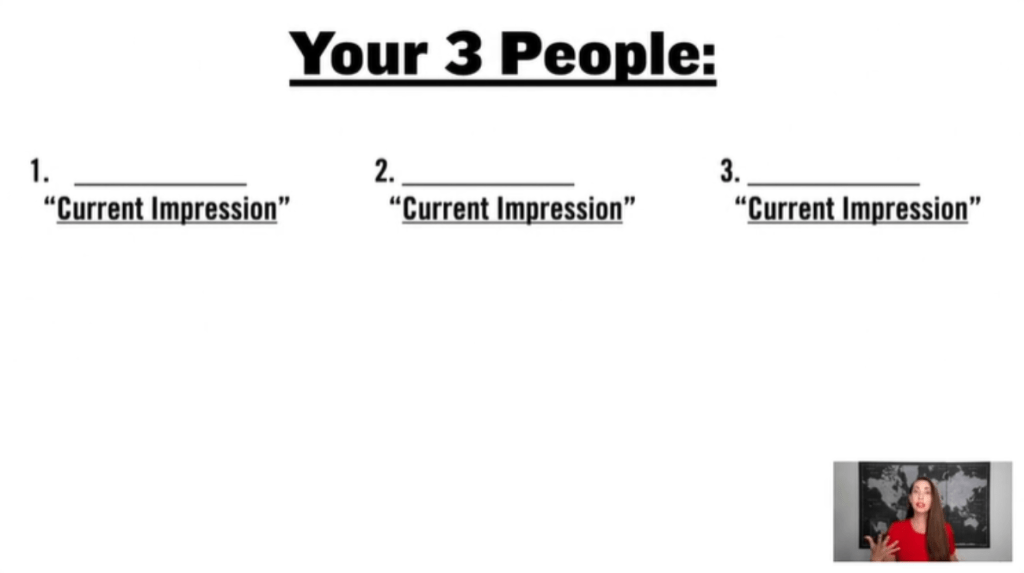
Next, answer this question: “I wish my colleagues would describe me as _____.” List as many specific adjectives as you can underneath the previous bullet.
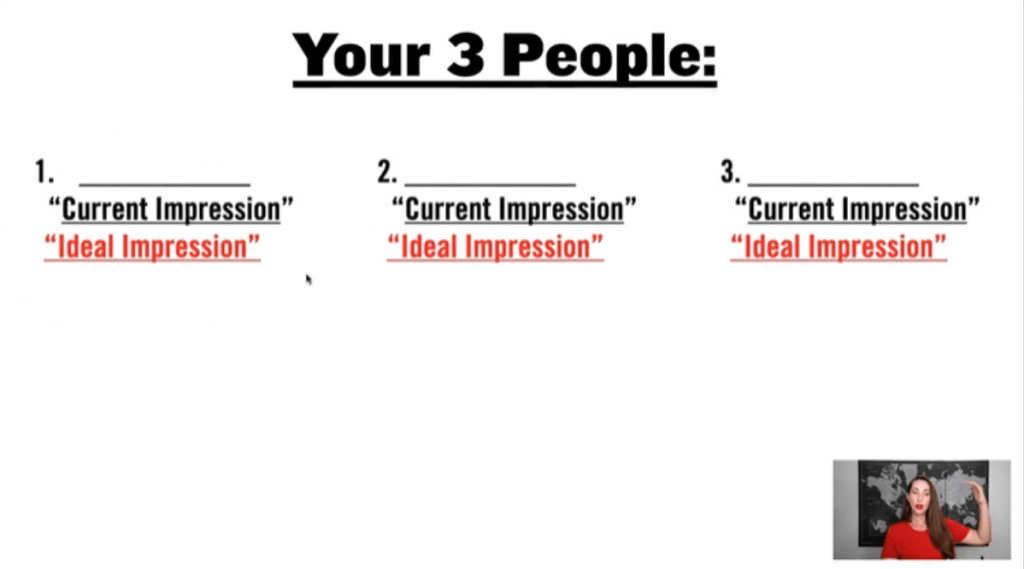
Now that you’ve written down your 3 people and your thoughts, you’ve got a clearer idea of how you want to change your impression.
And it all starts with labels…
Choose Your Own Label
Think about the labels that you want to embody. The more specific they can be, the better.
If you don’t choose your label, someone else will.
Here are some labels that can help you choose:
- Indispensable
- Ultimate Problem Solver
- Team Collaborator
- Mr. or Mrs. Fix It
- The Go-To Person
- Strategist
- Dynamic Collaborator
- Super Organized
- The Gets-It-Done Person
- Ultimate Coordinator
- Champion Multi-tasker
- Incredible Speaker
- Super Smart
- King/Queen Maker
Action Step: Choose your labels! Get a pen and paper and answer the 2 questions below:
- What stories and tasks can help you embody your ideal label? Write the label you want to have and brainstorm stories or tasks under it where you illustrate this label. For example, if you’re going to embody the “Creative” label, you can think of times in the past when you were highly creative. Or give yourself tasks that will boost your creativity.
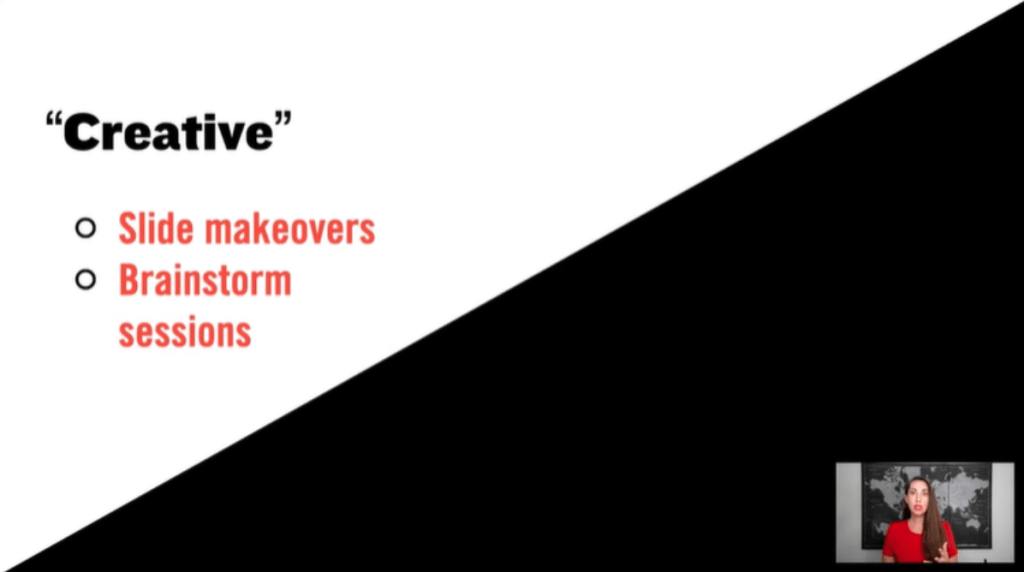
- When do you best embody this label? Think of the time you best represent your chosen label. It can be a specific time of the day, like right after a workout or a situation like during a client meeting.
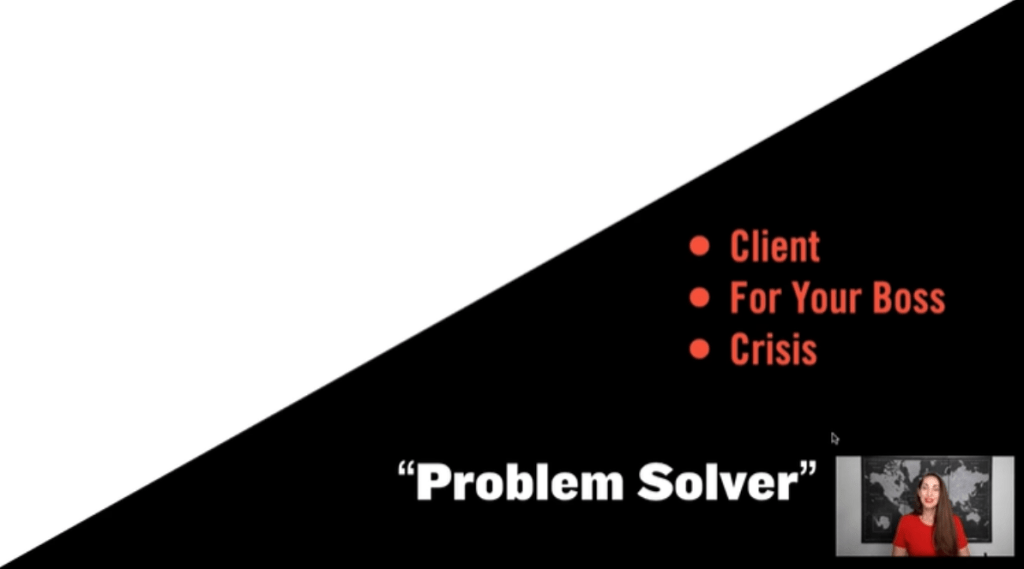
If you have trouble thinking of stories or tasks, this next step is definitely for you.
Craft Your Impression Purposefully
Do you have a carefully thought-out idea of what your impression should be? Or do you leave it up to others to decide?
To craft your impression, remember these practical steps:
- Use the labels for yourself that you want others to use for you.
- Ask for tasks that showcase your talents.
- Avoid what triggers you away from your ideal impression.
And if you want to take a deep dive into how your impression should be, check this out:
Action Step: Master your elevator pitch. Your elevator pitch is a 20–30 second speech that showcases your unique talents and what you have to offer.
Learn how to write your elevator pitch, and you’ll naturally identify your labels: 9 Steps to the Perfect Elevator Pitch
Ask For Opinions And Advice Regularly
Another mistake intelligent people make is thinking they can figure everything out by themselves. They believe that asking for advice makes them feel lesser. But actually, REALLY smart people know they have to ask for advice.
Research by Harvard Business Review shows that people who received advice received 56% more ways to improve than just “feedback.”
Asking for advice is more helpful than asking for feedback.
Action Step: In your list of three people, think about what advice you can ask from that person. Do you think they can help with your public speaking? With your work performance? Write the advice under their respective columns.
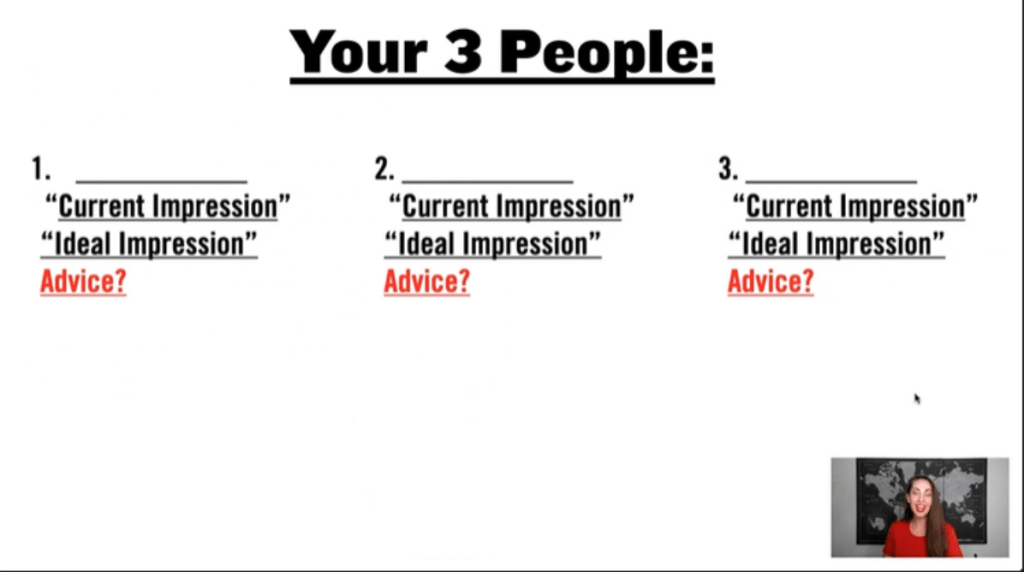
Pro Tip: Most of the time, you might feel nervous and anxious to ask for advice from the people around you. To help you, try using these steps:
- Share your goal with your label. You can say, “I want to be seen as indispensable to you as a client.”
- State the problem. You can say, “I know you are going through major change.”
- Ask for help or advice. You can say, “How can I be the most supportive to you this time?”
Another example of using the formula could be saying:
- “My goal is to do more presenting for the company.”
- “I know this is not my typical role.”
- “What can I do to break into this area that would be most supportive to the company?”
Enhance Your Social Memory
Social memory is the ability to use and remember tips, facts, and tidbits about the people we care about. Social memory is one of the least utilized social skills. We use it to remember various things about people:
- Birthdays, anniversaries, and kids’ names
- Your colleagues’ preferred mode of communication, most creative times of day, and social preferences
- Your friends’ triggers, worst times, and recharge times
If you’re asking for social capital, you have to give social capital.
Action Steps: In your 3 people list, fill out the following notes that you can remember about the people you’ve chosen:
- Partner
- Kids
- Birthday
- Preferred Coffee Order
- Preferred Communication
- Favorites
- Notes
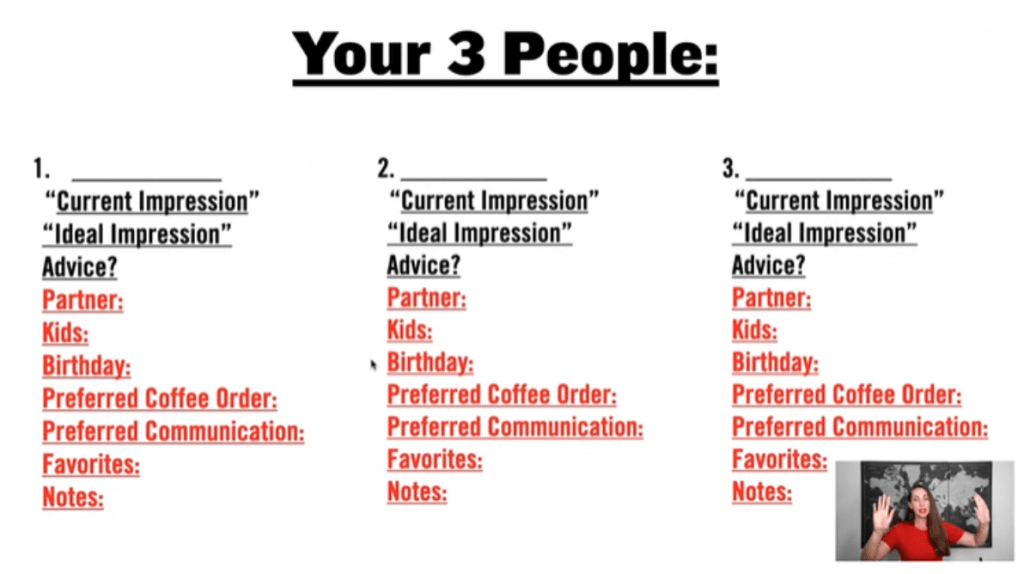
You can also use social capital to fit with your label. Here is how it goes:
- If you want to build rapport, remember birthdays and personal days.
- If you want to be more competent, remember dates and deadlines.
- If you want to be creative, get creative with how you remember (uniques gifts, fun celebrations, etc.)
Tie Your Career Goals To Your People Skills
Let’s take a look at these exciting research data about financial success and our people skills:
- 15% of our economic success is due to technical ability.
- 85% of our economic success is due to people skills.
- Master communicators make an average of $29,000 more per year.
Action Step: Grab your pen and paper and brainstorm what you’d like to achieve. Create two columns, one for outcomes (what you want to happen in your professional life) and one for rewards (the benefit you’ll receive from your outcome). The table below is a sample for you:
| Outcomes | Rewards |
| Get a raise / Raise my rates | Have financial freedom |
| Build a relationship with a VIP | Love my work |
| Have confidence sharing my ideas | Feel less burned out |
| Get a promotion | Find supportive community |
| Get more respect | Wake up excited |
| Land an ideal client | Feel less drained |
Realize that you can achieve most of your outcomes by mastering your people skills.
Advancing your people skills is the best investment you can make in your career success.
